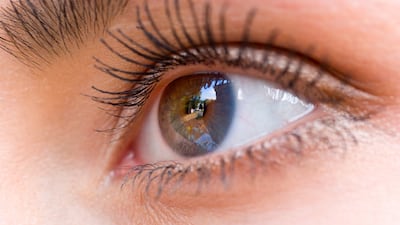Early diagnosis of Alzheimer’s disease could be a step closer should regulatory approval be given to an eye test assisted by artificial intelligence.
Although new drugs are making the condition easier to treat, diagnosis remains a challenge for doctors.
That could be about to change.
Technology developed by Canadian medical imaging firm RetiSpec claims to offer a window to the brain to detect early signs of the degenerative disease.
AI technology mounted on an optometrist's camera evaluates a retinal scan of the back of a patient’s eye.
Images can reveal the presence of amyloid, a sticky protein that begins to develop in the early stages of Alzheimer’s disease.
On detecting the protein, a sensor relays information into an AI algorithm to determine the pathology of the disease.

Earlier treatment, better results
Eye tests are already known to help medical professionals diagnose several conditions, by giving a view of tiny blood vessels that supply the retina.
Images can help doctors diagnose diabetes, high blood pressure, thyroid disease, rheumatoid arthritis and brain tumours.
Although still in the midst of approval processes in North America, scientists said the new test could enable earlier treatment for those most vulnerable to Alzheimer’s.
“Alzheimer's is very common with a high disease burden in the elderly – both for the patient and the family, so it is important to identify it early,” said Dr Prachet Kulkarni Krishnamurthy, consultant neurologist at NMC Royal Hospital Sharjah.
“This kind of brain imaging can help us to arrive at a diagnosis in conjunction with clinical findings and after excluding other causes.
“It can also help us to exclude other causes which can mimic Alzheimer's disease, educate the care giver and start the new promising drugs early.”
Alzheimer's disease is one of the most common degenerative diseases in older people.
Experimental drug Donanemab has shown to slow the progression of the disease by up to 35 per cent during clinical trials.
The drug works by removing amyloid from the brain.
The disease is characterised by progressive loss of memory, intellectual capacity, ability to judge, calculate, an inability to frame sentences and speak.
“The signs of Alzheimer's disease are memory loss disrupting daily life,” said Dr Krishnamurthy.
“It can cause difficulty in planning or solving problems, difficulty in completing familiar tasks or an inability to understand visual images or spatial relationships.
“There can also be problems with speaking and writing, misplacing things, poor judgment, withdrawal from work or social activities and changes in mood and personality.
“It is important to know there are many diseases which can mimic Alzheimer's disease, for example nutritional deficiency and thyroid abnormalities, which can and should be treated early so accurate diagnosis methods are important.”
Symptoms of Alzheimer’s can occur in varied combinations and at different times.
The incidence is directly proportional to age, meaning the older the individual, the higher the chance of getting Alzheimer's.
Around five per cent of people above 65, 13 per cent those above 75, and 33 per cent of people over 85 have the disease.
Less invasive testing
Typically, doctors would detect early signs of Alzheimer’s using diagnostics such as a positron emission tomography (or PET) scan.
The test produces images of organs and tissues by injecting a radioactive chemical called a radiotracer.
The scanner detects diseased cells that absorb large amounts of the radiotracer, which indicates a potential health problem.
Like a spinal tap, which is also used, diagnostic tools can be expensive, and invasive.
Using a simple eye test could transform the way medics look for the disease.
Dr Sharon Cohen, a neurologist and medical director at Toronto Memory Programme, worked as a scientific consultant with RetiSpec.
“The RetiSpec team is moving Alzheimer’s disease biomarker science forward in an exciting direction,” she said.
“Retinal imaging holds promise for clinicians, patients, and those involved in drug development to pre-screen and predict cerebral amyloidosis in a non-invasive manner within the clinic setting.”
Meanwhile, Dr Wissam Charafeddin, an ophthalmology consultant at Barraquer Eye Hospital UAE Dubai, said more research was required.
"It is important to keep in mind that while retinal Hyperspectral Imaging (rHSI) cameras are highly promising, challenges such as standardisation, data interpretation, and accessibility remain.,” he said.
“Developing robust algorithms to analyse hyper-spectral data and distinguish between normal ageing changes and Alzheimer's-related alterations is a complex task and requires large, controlled studies.”


